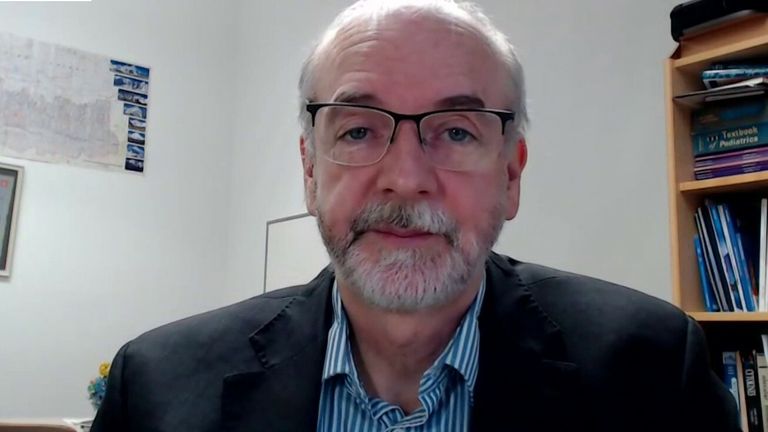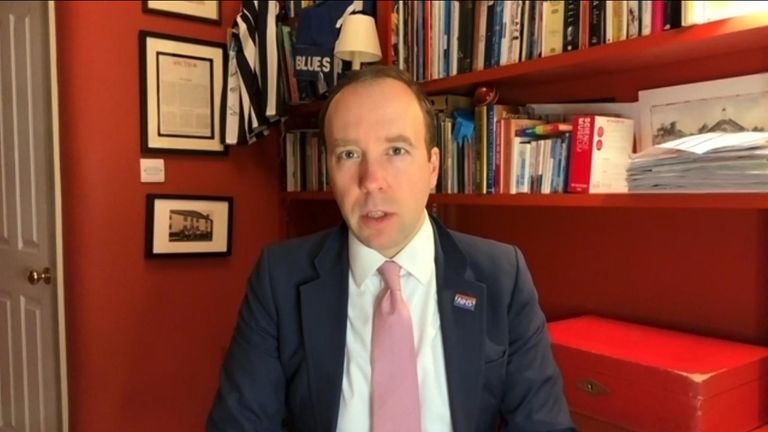
COVID-19: Matt Hancock hails ‘good news’ as study shows vaccine slows virus
A new study showing a single dose of the Oxford/AstraZeneca vaccine can significantly reduce the spread of coronavirus “categorically” supports the government’s jabs strategy, Health Secretary Matt Hancock has told Sky News.
Researchers from the University of Oxford found that their vaccine offers protection of up to 76% up to 12 weeks after a single dose and may reduce transmission by 67%.
The team said their study, which hasn’t yet been peer reviewed, also showed that – after a second dose – efficacy of the vaccine is 82.4%, if the interval between jabs is three months.
Live COVID updates from the UK and around the world
This compared to 54.9% for those where the booster was given under six weeks after the first dose.
Speaking to Sky News, Mr Hancock hailed the study as supportive of the government’s decision to delay giving a second vaccine dose to people for up to 12 weeks, as part of a push to get as many people as possible in the UK vaccinated with an initial first dose.
The decision had made the UK an outlier among those countries who have begun vaccinating their populations, with most leaving a much smaller gap between doses.
“This Oxford report is very good news, it backs the strategy that we’ve taken and it shows the world that the Oxford vaccine works effectively,” Mr Hancock said.
“The really good news embedded in it is that it not just reduces hospitalisations – there were no people in this part of the trial who are hospitalised with COVID after getting the Oxford jab – but also it reduces the number of people who have COVID at all, even asymptomatically, by around two-thirds.
“That reduction in transmission, as well as the fact there is no hospitalisations, the combination of that is very good news and it categorically supports the strategy we’ve been taking on having a 12-week gap between the doses because it shows that the strength of the protection you get is, in fact, slightly enhanced by a 12-week gap between the doses.
“It is good news all round.”
Dr Andrew Pollard, the chief inspector of the Oxford vaccine trial, told Sky News the study showed there was “sustained protection” in the three months until a second dose is given – once the initial immune response has kicked in around two to three weeks after a first jab.
“We have not seen any additional hospitalisations in those who are vaccinated,” he said.
“I think this is really good news – as we are seeing from all the vaccines that we now have information about – that they are preventing severe disease and hospitalisations consistently in different countries, in different geographies, and some emerging data even in countries where the new variants are more common.
“So I think that’s really encouraging news that we might have enough immunity from the vaccines to control the variants, in terms of hospitalisation.”
Subscribe to the Daily podcast on Apple Podcasts, Google Podcasts, Spotify, Spreaker
But he added there was a “concern” that COVID variants might allow the virus to carry on spreading and causing milder infections.
Dr Pollard said there would “fairly soon” be data on the impact of the Oxford/AstraZeneca vaccine on the UK variant, which was first discovered in Kent.
He added: “I think most scientists are confident that the vaccines will have a good impact against that variant because it hasn’t picked up many mutations that should be avoiding human immune responses, whereas some of the other variants have absolutely been appearing in settings where there’s a need for the virus to escape from human immunity.
“Those are going to be much more difficult to block from transmission.”
Source: Read Full Article

